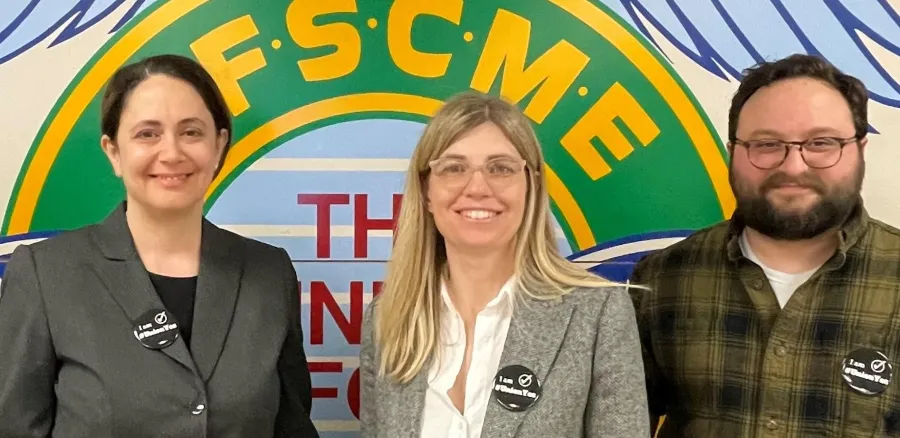Public Defender Attorneys Win Parity in Pay

When Connecticut public defender attorneys (AFSCME Local 381) discovered in May their state attorney counterparts, the prosecutors, would receive wage increases to boost recruitment efforts in their ranks, they asked, “Why not us?”
Public defender attorneys with the CT Division of Public Defender Services and state prosecutors with the Division of Criminal Justice perform similar work. As both agencies face difficulties in hiring qualified attorneys to carry out the mission of their agencies, the public defenders were justified in their questioning of fairness. Over the next several months they came together and won wage parity with the state prosecutors.
The spirit of not giving up and overcoming roadblocks was a major theme of their success and helped fuel the public defenders in their pursuit.
“You learn as a public defender if you try and keep working at it, you can do stuff that nobody thought you could do,” Laila Haswell, Local 381 President said. “Persistence is key.”
Haswell is a Senior Assistant Public Defender in the Legal Services Unit and has worked for the Division for 24 years. She represents over 150 public defender attorneys working across state offices to provide legal services to persons accused of crimes who are unable to afford legal assistance as required by both the U.S. and state constitutions.
After learning about the new wage agreement between state prosecutors and the administration, Haswell approached the Division’s Human Resources to request parity. When she was told parity was impossible because funds allocated by the General Assembly were already budgeted for, she refused to simply take their word for it.
“It occurred to me not to let that go before I thoroughly investigated it,” Haswell said. “I figured there may be a way. I didn't know what it would be, but I thought there might be a path to doing this.”
At first it was difficult for Haswell to get information on how it could work. She talked to union leaders of the CT Association of Prosecutors and counsel for the governor’s office. She spoke to experts outside the Division and worked with Council 4 staff to calculate how much parity would cost. Brian Anderson, Council 4 Legislative and Political Director, assisted in gathering information and talking to state officials. All the while management kept saying it could not be done.
In September, the union learned during a Public Defender Services Commission meeting that there was a surplus that could be used for the wage increases. Local leaders were shocked to realize the Division had a surplus that would fund the increases, since last fiscal year surpluses were given back to the legislature. The union now saw a viable pathway but still had to negotiate with the administration who was attempting to hold off discussions until 2024.
“The major problem was management not wanting to do this,” Haswell said. “They said they couldn’t afford it. They said the Office of Policy and Management had to approve it, then said it was the legislature. They said the prosecutors had a [special] clause in their contract that allowed them to reopen it [for wage negotiations]. Then they wanted to wait until January. The way they put us off and didn’t engage was difficult.”
A turning point came when the union spoke to the Public Defender Services Commission in public session. The Commission is an independent body that oversees the workings of the DPDS. When they learned of the pay discrepancies, all the Commission members supported parity.
The Commission directed the Chief Public Defender to negotiate with the union and allow the raises to be finalized. On October 5, Haswell and Council 4 staff representative attorney, Anthony Bento, met with management to reconcile the numbers and revise the agreement, which allowed most bargaining unit members to receive a salary upgrade. Those eligible received on average an 11% general wage increase and a lump sum since modifications were applied retroactively.
For the public defenders, parity with the prosecutors is more than just higher wages. It’s affirmation that their work is invaluable and an essential piece of fostering a more equitable justice system.
“It’s critical for public confidence in us,” Haswell said. “There’s this idea that we’re not real lawyers. So, for us to be behind the prosecutors sort of confirmed that stereotype. We’re representing mostly Black and Brown people. It’s intolerable that we would not make as much as the people who are putting them in jail. It’s fundamentally unfair to our clients.”
The new raises would also aid recruitment of more attorneys and help balance their exceptionally high caseloads. For the 2024 SEBAC wage reopener, the public defenders are now in a better starting position since they have caught up to the prosecutors’ wage scales. Overall, the union expects their success in reaching parity will contribute positively to lifting worker morale and the clients they are dedicated to serving.
“Everybody works hard for their clients no matter what,” Haswell said. “But being satisfied at your job and feeling like you’re being treated fairly, certainly has an impact on your performance. I think this change will hopefully build confidence in our abilities going forward.”
